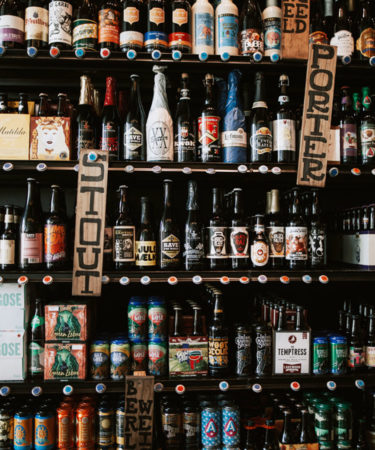According to data published in the New Brewer, a Brewers Association publication, a majority of the top 50 brewing companies did not grow in 2018. This is the third year in a row at least half of the top 50 did not see growth, Brewbound reports.
Beer volumes declined for Yuengling (-2 percent), Boston Beer (-7 percent) and New Belgium (-11 percent), which are the Nos. 1, 2, and fourth-largest independent breweries, respectively.
Sierra Nevada, the third-largest craft brewing company in 2018, returned to growth in 2018 (+2 percent) after several years of decline. The fifth-top brewery, Duvel Moortgat USA, grew 5 percent, thanks to subsidiary Firestone Walker, which grew 12 percent. Duvel’s other acquisitions, Boulevard Brewing and Brewery Ommegang, declined 10 percent and 8 percent, respectively. Gambrinus, Deschutes, Artisanal Brewing Ventures, and Brooklyn Brewery also declined in 2018.
Top-50 breweries that saw single-digit growth include Bell’s Brewery (+3 percent), Canarchy (+3 percent), Stone (+3 percent), SweetWater (+2 percent), and New Glarus (+2 percent). Additionally, four top-50 breweries that saw double-digit growth include Rhinegeist (+16 percent), Three Floyds (+25 percent), Georgetown (+37 percent), and Two Roads Brewing.
At a certain time in my life, I was head over heels for Ommegang and its bright, balanced Belgian-style ales. And when the picturesque brewery produced an IPA with all-New York State hops, I was equally enthralled. But when better options became available in my own city at every turn, I lost interest. (Ommegang will forever hold a place in my heart, though.)
I’ll almost always choose a hyper-local option over a regional brand, and I know I’m not alone. Beer bars, bottle shops, and beer drinkers once excited by regional brands are putting our dollars toward smaller, local outfits because we can — and we want to support the quality beer that’s made right here in our communities. At the same time, we are always searching for something new.
Beer geeks are loyal to local, yet devoted to discovery. For top-50 regional beer brands to survive, they need to convince the general beer drinker that more flavorful (and more expensive) beers are worth deviating from the everyday Big Beer brands.
Craft Beer Moral Crime Blotter, June 6 Edition: Dempster Fire
There’s been an alarming amount of offensive social media announcements from breweries lately. On Monday, Southern Bay Brewery of Australia posted a meme on its Facebook page referring to non-alcoholic beer as “gay lemonade.” The brewery apologized, asking fans for forgiveness. Brewery CEO Nick Warming announced his resignation the next day, and the Southern Bay Brewing Facebook page has since been deleted.
On May 27, Mirage Beer Company posted on Instagram about an upcoming release of two companion beers: “Snitch Blood” and “Where You From.” The can labels depicted red and blue bandana designs, cementing the beers’ references to the Crips and Bloods, rival Los Angeles gangs responsible for the deaths of thousands of Americans.
It’s beyond cultural appropriation at this point. Y’all suburban shitheads better be ready with a mf’n resume when the folks you out here mocking show up to collect. pic.twitter.com/aSrMPMd6Dc
— Urban Craft Curiosity (@tonitwopint) May 27, 2019
Mirage Beer swiftly apologized for its “dumb idea,” adding the company would “still … release the beers, but obv [sic] with new names, and all proceeds going to the Southern Poverty Law Center.”
“I feel awful that I hurt or angered anyone,” brewery owner Michael Dempster writes in a lengthier apology on Medium. “I also want to thank members of the beer community for forcefully saying, ‘check your privilege,’ as I clearly needed that check. Your responses give me hope for this industry, and kept me from making an even bigger mistake: actually using those stupid labels and letting them hit shelves, where they could then hurt, anger, or disenfranchise anyone who passed them.”
How did the beer community respond? Surprisingly, pretty well.
“For any breweries watching, this is an exemplary written apology,” Toni Canada, of Beer Kulture, wrote on Twitter. “[B]ut what happens next will be key, and we’ll be watching.”
Washington Beer Blog echoed, “Michael Dempster and Mirage Beer deserve our consideration and not our dismissal. We all make mistakes. What we do thereafter is the measure of our character.”
Mirage’s gang-themed beer labels may not have made it to store shelves, but they point to a glaring need for more eyes, ears, and input from people outside a company’s comfort zone to provide a perspective others may stupidly miss. There is no excuse for letting harmful ideas go this far, but there is potential for breweries to acknowledge their missteps and change their approaches. Mirage sets an example that I hope other breweries will learn from.
Aloha: Kona Owner Pays Up for False Advertising
After agreeing to settle a years-long class action lawsuit in April 2019, Craft Brew Alliance will partially refund Kona beer drinkers for leading them to believe its beer is brewed in Hawaii, Reuters reports.
Those who purchased Kona 4-packs, 6-packs, 12-packs, or 24-packs since Feb. 28, 2013 can be refunded $1.25 to $2.75 per purchase, with maximums of $20 per household with receipts, and $10 per household without receipts. Craft Brew Alliance (CBA) expects to lose a total of $4.7 million.
Kona is the main lifeline of CBA, a Portland, Ore.-based brewing company whose subsidiaries also include Redhook and Widmer Brothers breweries. CBA is itself partially owned by Anheuser-Busch InBev, and a majority of its brands are brewed in Oregon, Washington, New Hampshire, and Tennessee. Kona draft beer sold in Hawaii is brewed there.
Class-action lawsuits are fun, but do they really get us anywhere? If this settlement raises awareness of false advertising, encourages big breweries to be less sneaky, or alerts more consumers to the devious tactics of marketers, great. I really don’t see that happening, though.
